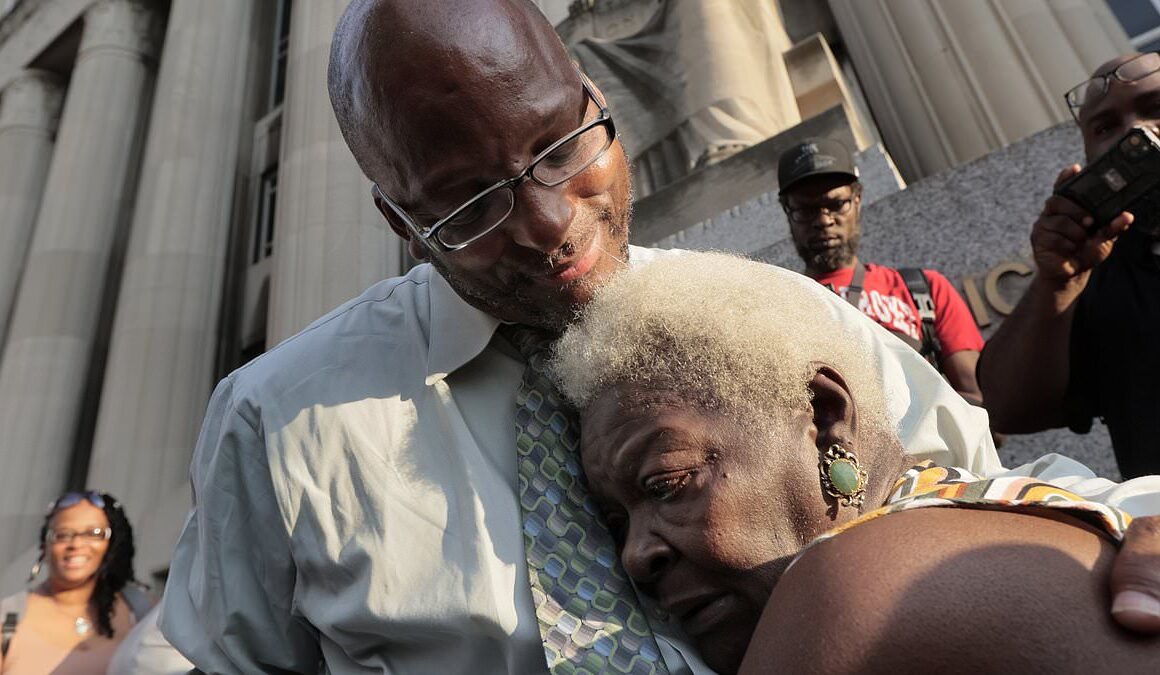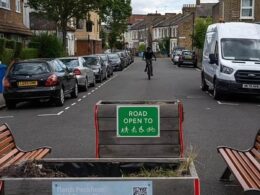A black man from Missouri tasted freedom for the first time in 34 years as he walked free from a courthouse Tuesday night after his murder conviction was overturned.
Christopher Dunn was reunited on the St. Louis courthouse steps with his wife, Kira.
‘I never gave up because my family never gave up. It’s easy to give up in prison when you lose hope. But when the system throws you away, you have to ask yourself if you wanted to just settle for it or fight for it,’ Dunn told a gathered crowd.
Dunn, 52, has long maintained that he was not involved in the fatal shooting of 15-year-old Ricco Rogers in May 1990. Rogers sitting at home on his porch when he was shot.
Earlier this month, St. Louis City Judge Jason Sengheiser ruled that new evidence had undermined his conviction and that no juror would find him guilty beyond a reasonable doubt.
Despite this, the Missouri Supreme Court ruled on July 30 that Dunn must remain in prison pending a new trial in the crime. Republican Missouri Attorney General Andrew Bailey also advocated for Dunn to remain behind bars.

Innocent man Christopher Dunn, 52, is flanked by his wife, Kira, as he speaks to reporters about his wrongful conviction

Dunn hugs his mother, Martha, who told local media that she just wants to ‘holler’ following his release
The court then vacated its ruling, allowing for St. Louis Circuit Attorney Gabe Gore to formally drop the charges, allowing for Dunn’s release.
In a statement, the Midwest Innocence Project said Dunn is ‘coming home.’
‘We are thrilled that Chris will finally be reunited with his family after 34 years behind bars for a crime he did not commit. We look forward to supporting Chris as he rebuilds his life,’ the press release continued.
His mother took a more enthusiastic approach.
‘I feel like I just want to get up and holler. That’s how I feel… It shouldn’t have been this long. Nor should have it taken this long for everyone to come forward now,’ Martha Dunn told Fox St. Louis.
Lawyers for the state have argued against Dunn’s conviction being overturned at a hearing in May.
They claimed that initial testimony from two boys at the scene of the May 18, 1990 shooting, who identified Dunn as the shooter was correct – even though they later recanted their statements as adults.
‘The verdict was accurate and that verdict should stand,’ Assistant Attorney General Tristin Estep argued.

Christopher Dunn’s murder conviction was overturned earlier this month but he remained behind bars

Dunn was arrested after two teenagers identified him as the gunman who shot and killed 15-year-old Ricco Rogers
She also claimed that Dunn’s alibi could not be trusted, saying he changed his story multiple times over the years.
He had said he was at his mother’s house at the time of the shooting, and his childhood friend testified that she spoke with him by phone that night – asserting he was using a phone at his mother’s house.
The decision to keep Dunn incarcerated until now puzzled St. Louis Circuit Attorney Gabe Gore, whose office investigated his case and determined he was wrongfully convicted, prompting a May hearing before Sengheiser.
‘In our view, the judge’s order was very clear, ordering his immediate release,’ Gore said at a news conference Tuesday.
‘Based on that, we are considering what approach and what legal options we have to obtain Mr. Dunn’s relief.’ He declined to specify what legal options were under consideration.
Dunn’s potential freedom was made possible under a Missouri law adopted in 2021 that lets prosecutors request hearings when they see evidence of a wrongful conviction.
The law has resulted in the the release of two men who have each spent decades in prison.
Lamar Johnson was freed last year after serving 28 years for a murder case in which a judge ruled he was wrongfully convicted.
Additionally, Kevin Strickland was freed in 2021 after more than 40 years for three killings in Kansas City after a judge ruled he was wrongfully convicted in 1979.
Another hearing is next month for Marcellus Williams, who narrowly escaped lethal injection and is now facing another execution date.








